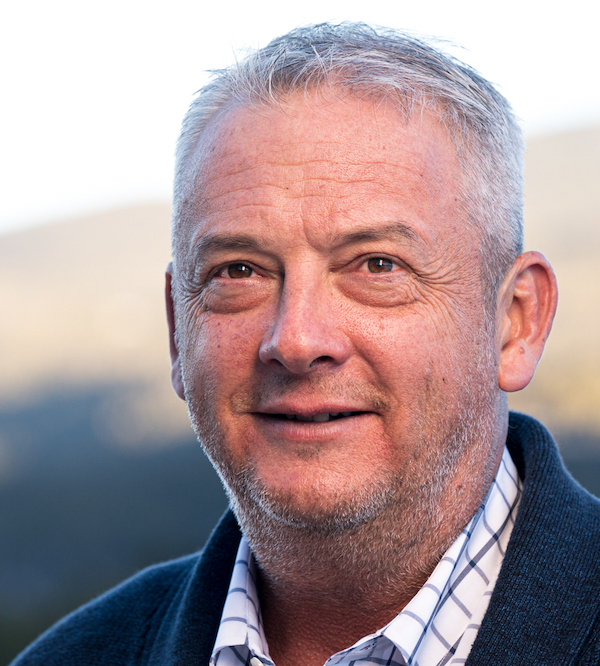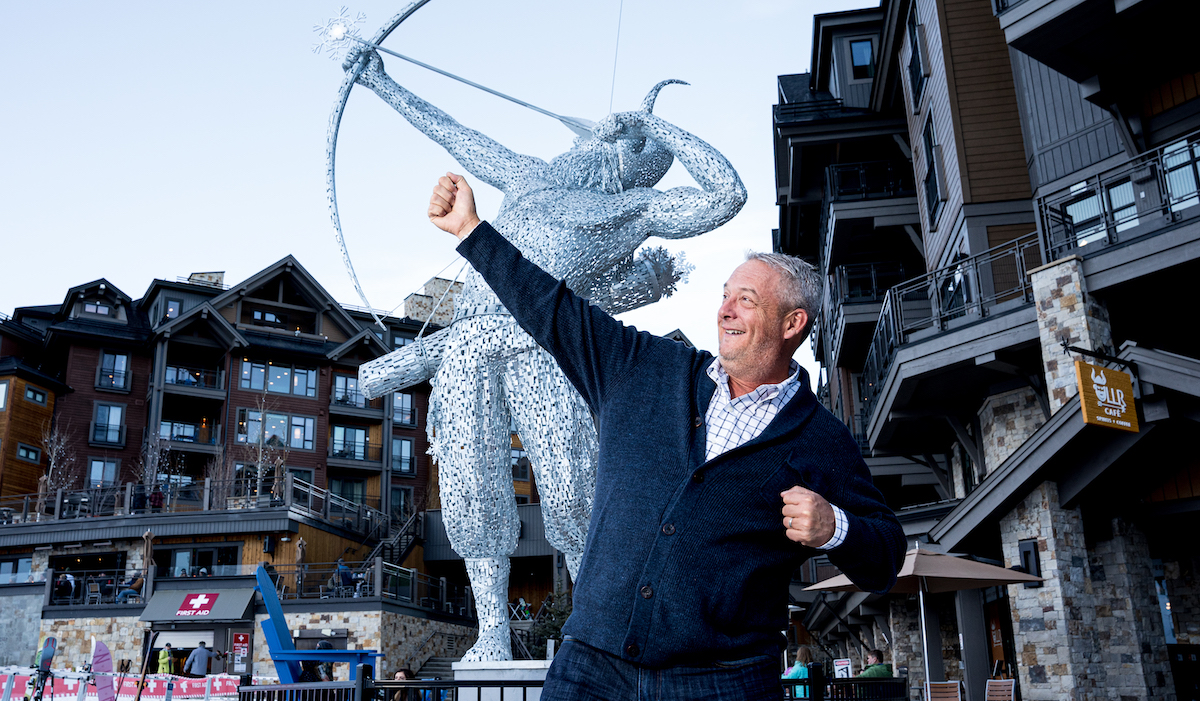Faces of Hope with BGV’s CEO,
Mike Dudick
The Grand Negotiator
“Do you miss it?” I ask. “Yeah sure,” he says, “every once in a while, I wouldn’t mind having a drink in a social setting. But that’s a fleeting thought today, whereas it wasn’t two years ago. When you stop drinking, your negotiations with yourself change. Yeah, it would make me feel good for a minute, but I know that later on I’m going to feel better about not doing it, and then I win the negotiation.”
By all accounts, Mike Dudick is an excellent negotiator. He’s a successful marketer, manager and developer, a generous philanthropist, active community leader, and CEO/co-owner of Breckenridge Grand Vacations (BGV), an independent timeshare company and the largest year-round employer in Summit County (600+) outside of the ski area.
But when it came to alcohol, Dudick’s skills failed him. “Alcohol was always the better negotiator,” he says, with a laugh. “It got me to cut all kinds of deals with myself to have another week, just another day of drinking. If you get to that point like I did where you’re negotiating between yourself and alcohol, I promise you’re going to continue to lose that negotiation,” he says. “And it’s a great breakthrough moment when you realize you’re never going to win without help.”
Now nearly two years sober and intensely grateful for the changes it has brought to his life, 55-year-old Dudick shared his recovery journey in the sunlit BGV office at the corner of Main St. and Ski Hill Rd. in Breckenridge. Behind him, there’s a poster of the mountains with the line, “Choose to be great,” one of his mantras. “When I was drinking, I was pretty good at what I was doing, but was I great? No. I couldn’t choose to be great as long as I was losing negotiations to alcohol.” Another poster offers the line, “If it was easy, everyone would be doing it,” a nod not only to the powerhouse company he helped grow, but to his decision to become sober in a party culture community that he happily promoted for almost three decades.
Open about all aspects of his journey, Dudick is articulate about his relationship with alcohol and passionate about helping others who’ve also lost their ability to negotiate with the substance. “Addiction is indiscriminate, regardless of your position in the community,” he says. “It can happen to anyone. It happened to me. Alcohol got control of me and I had to take it back. If there are things I can do to help someone take back their control, call me. I will help.”
✴ ✴ ✴
Mike Dudick found his way to Breckenridge 32 years ago in much the same way many local long-timers did – he came on a college ski trip and basically never left. Back then, Breckenridge was a laid-back little town with only a single stoplight, but one full of opportunity for a young man with a college degree, an entrepreneurial spirit, and a boatload of energy.
In those early days, he worked at a liquor store and tended bar at what was then Adams St. Grill on Main St. He met his first wife and in quick succession had Michael, now 31, Sam, 28, and Chloe, 26. Knowing that raising three kids on bartender tips was unsustainable, Dudick launched Breckenridge Magazine in 1988, teaching himself graphic design, ad sales, and the publishing business, all the while continuing to bartend and change diapers in the middle of the night. It was during this sleepless ten-year span with the magazine that he met and became impressed with developer brothers Rob and Mike Millisor, who at the time, owned the Gold Point condos (later named Gold Point Resorts) on Baldy Mountain and were beginning work on the Grand Timber Lodge.
Timing is everything, as they say. “I was growing weary of the ad business,” says Dudick. “I was ready to do something different, so I sold my business, invested my proceeds with Mike and Rob, and took over marketing for them when Grand Timber Lodge was just a hole in the ground.” That was 23 years ago. Grand Timber opened in 1998, and the team went on to open the Grand Lodge on Peak 7 in 2007, and the Grand Colorado Peak 8 in 2015, now among the most prized vacation destinations in the Colorado Rockies.
Dudick met Anna, his second wife, during this time. A native of Cincinnati and a University of Indiana graduate, Anna followed a boyfriend to Breckenridge in 1998, just as Grand Timber Lodge was finding its footing in the timeshare vacation destination business. Her first job was at the front desk of Grand Timber Lodge, where over the years she worked her way up. During the course, she and Mike met, fell in love and were married in 2005. They have a son together, Henry, now 13.
Dudick describes life during those heady times, when everything was falling into place for him personally, and for BGV: “The company had a ‘let’s work hard and party harder’ kind of culture,” he begins. “When BGV started taking off we were all in our mid to late 30’s, early 40’s. We were bulletproof, things were great, everyone was having a good time, the business was successful, we had great employees. We knew the success of our company would be determined by the positive impact it had on our owners and guests, employees and the community, so we all worked hard to make that happen; we focused on success and getting things done. That said, everyone around here knew when it was five o’clock. We would go across the street, have a couple on the way home — that kind of thing.”
“Age was on my side at that point, just being able to process alcohol, then get up to fight another day,” he continues. “It was an ‘exhale’ period, with my kids getting older and knowing the business had the infrastructure to be on cruise control. I actively participated in the good- time culture that we had created.”
The sad and sudden heart attack death in 2015 of Rob Millisor shook the community as well as the company. Rob’s untimely death created a new leadership of two co-owners – Mike Millisor and Mike Dudick, with Dudick taking on the CEO role and day-to-day leadership of the Breckenridge company. Much has been done by BGV since Rob’s death to advance heart health research in the high-country. An annual fundraiser that bears his name was launched in 2016 by the charitable arm of BGV — called BGV Gives, which also gives generously to hundreds of nonprofits across the county and region, including Building Hope. The company also has an emotional wellness component for its employees, BGV Minds, that provides ongoing access, resources and education in support of living a balanced and healthy lifestyle both physically and mentally.
Rob’s death had a deep impact on Dudick. “The three of us had spent all our time together; we worked together, vacationed together as families, went to dinner together, watched all our kids grow up. We were very tight.”
will intervene – whether it’s a judge or a spouse or a parent. My family finally said, ‘you need to stop’ and I said, ‘you’re right I do.’
I didn’t fight. I knew it was coming …”
As his free time grew, so did his alcohol consumption. “Mike was a highly functioning alcoholic,” Anna says. “He didn’t have bottles in his desk drawer; he could get through the day, but when he got home, he put the pedal to the metal. And to be clear, I was drinking more then too. But I have a ‘stop’ button that Mike doesn’t have. I don’t think I recognized how bad it was until it stopped.”
When asked just how much he drank, Dudick says, “I only know that I drank more than anyone around me, easily. In a party crowd, I was easily the biggest consumer, hands down. I drank a lot. I didn’t have to worry about what time I woke up and what condition I was in the next morning. I didn’t have anything to slow me down. There was no one to fire me, no consequence. I was in a unique situation. I had responsibility, but I told myself that drinking wasn’t impacting my ability to fulfill my responsibilities. It never got to the point where I denied my responsibilities, I just always felt like I could manage them.”
Until he couldn’t. His wake-up call came in the form of a black-out evening of drinking in October 2018. The following morning, he couldn’t remember anything from the night before. “With alcohol, I didn’t have an on and off switch. I didn’t have a rheostat that lets me monitor my drinking. I got to a point where I thought I could hurt myself or someone else by doing something stupid.
“For most people, there is this period when you know you need to change but you just don’t do it. Often someone else will intervene – whether it’s a judge or a spouse or a parent. My family finally said, ‘you need to stop’ and I said, ‘you’re right I do.’ I didn’t fight. I knew it was coming. There was no sit-down drama like on reality shows. This was my moment. I wanted to stop.”
He started treatment two days later at an Alcoholics Anonymous-based 12-step program in Colorado Springs, but found frustration in both the facility and the program. “AA’s socialized way to identify is to say, ‘Hi I’m Mike, I’m an alcoholic,’ as if that defines me. While one definition of me is that I’m a recovering alcoholic, that does not define Mike Dudick. Say I’m overweight. If I went and lost 30 pounds I wouldn’t walk around saying, ‘Hi, I’m Mike, I used to be fat.’” We both laugh. “You shouldn’t have to wear a scarlet letter that pronounces who you used to be.”
When asked about his sobriety date, Dudick flusters. “I don’t know, you want me to check my calendar?” he asks, himself a little curious (it’s two years October 14). “That goes to the 12-Step approach to stopping. 12-Step works for a lot of people, but on a daily basis you’re reminded of how long you’ve been sober, and if you stop being sober for a day you have to start all over again. It confirms the idea that you’re always thinking about the last drink and can’t wait to have another, and that’s not where I’m at.”
At the same time, he vigorously defends AA. “There needs to be a judgment-free zone about it,” he says. “Whatever works for the individual works. My father and many friends are devoted AA members; they get to hang out with like-minded people and find support in their community and it works great for them, and millions of people around the world, but it didn’t work for me, and that’s ok. There are many paths to recovery, no one size fits all. If it’s the 12-Step program, awesome. Put as many tools in your tool chest; give yourself a fighting chance.”
Anna worked to find an alternative treatment center and after two weeks in Colorado Springs, Dudick transferred to Atlanta-based Accelerated Recovery Center, an in-patient treatment program devoted solely to alcohol dependence. According to its website, Accelerated Recovery “provides the only comprehensive, research-based treatment program in the United States that is focused exclusively on the successful, long term treatment of alcohol abuse and dependence. Accelerated’s treatment programs are based on medical and clinical science and provide a rare alternative to 12-Step based treatment.”
Accelerated offers five, 12 and 19-day programs. Dudick stayed for 12 days and was grateful for both the brevity, and for what he considered effective treatment.
For Anna, it was the initial question they asked that impressed her about the place: Are you ready to unconditionally move forward and not talk about the past anymore? “It took me a little bit because I had anger about the past, but I realized there’s no point in that. Mike couldn’t change it, he couldn’t control it. We just needed to move forward.”
Dudick spent eight hours/day for two weeks in intensive education and therapy, learning about the disease and receiving counseling and therapy, “talking through life and learning about the disease from a science-based perspective.” He was put on two medications – Naltrexone and Baclofen. One stopped the cravings, the other reduced anxiety around not drinking. “That kind of program made a lot of sense to me,” he says. “Together with the medication and the therapy, it re-wires your brain to stop the nagging, ‘is it five o’clock yet’?”
He also learned a lot about how alcohol changes your brain. “With addiction, the opioid receptors in your brain are saying give me more, and there’s a sort of shock absorber, which is your brain’s ability to reason and negotiate – that gets smaller and smaller, until you end up in a really messed up place. Your brain craves more and you have less and less ability to say no to the urge.” Finally, his failed negotiating skills with alcohol made sense to him.
Breckenridge Grand Vacations CEO Mike Dudick stands in front of the “Let it Snow” Ullr sculpture Nov. 19 at the Grand Colorado on Peak 8 resort. Dudick shared his struggle with alcoholism as part of the Faces of Hope series, a partnership between Building Hope Summit County and the Summit Daily News.
He’s unsure of the role medication played in his sobriety. “If you said to me, ‘they were placebos and I was part of a research control group, I’d say, ‘ok, I can buy that.’ If you said to me, ‘they were the real thing and in clinical studies they work 95% of the time to help people stop drinking, I’d say, ‘well, thank God I had them.’ All I know is that I was committed. I knew I had to stop.”
He no longer takes the medication, hasn’t for a long time, and is on a steady and grateful path to longterm sobriety. He’s acutely aware of the lack of treatment services in Summit County and looks forward to being involved in efforts that can help others like he’s been helped. “I think it’s one of the priorities we really need to focus on as a community.” Anna agrees. As a member of the Building Hope board of directors, she’s in regular conversation with Executive Director Jen McAtamney about how to bring a treatment center to Summit County. “There are opportunities out there, we just have to figure out how to put the puzzle pieces together.”
For now, Dudick’s purpose is clear: to offer his help – whatever that looks like – to anyone who needs it. “I’m here to tell people that I had a problem and I did something about it and if you need help to solve your problem that you can talk to a guy like me. I’m not proud of the way I was before, but I’ll take pride in being able to help even one person.”
Dudick’s voice builds as he talks about how his life has changed in the past two years. “With this COVID situation and the responsibility I have to myself, my family and to the 600+ employees and the families that go with them, I need to take care of myself so I can make good, well-informed decisions that impact other people’s lives. It’s not like I’m some Forest Gump dude cutting the high school lawn. People’s paychecks, their mortgages and car payments, their savings for their kids’ college depends on people in the leadership of this company doing a good job.
“There’s no way you can convince me that I’m not exponentially sharper and better with the way things are going on a day-to-day basis than I was 2 years ago,” he continues. “I feel fortunate that I’m in that space today because it’s helping me be centered and grounded to make difficult choices, but to do the right thing to ensure the survival of the jobs and people that work here. I feel very fortunate that I got to where I am right now.”
Anna becomes emotional when asked about how life changed with Dudick’s sobriety. “Mike is a leader in so many ways, but especially in our family,” she begins. “Nothing works without Mike in our family,” She pauses, skimming away a tear. “He’s our leader, our protector and caretaker, and I became nervous when I felt that being threatened. He had been that way for us for 10-12 years before his drinking progressed. Now I think our kids and I know he’s solid, he’s there and he’s gonna take care of everything. And that’s who I married. It’s nice to be with the man I married,” she says, her eyes smiling. “He’s a rock. He wasn’t there for a little bit, but now he’s more solid than ever.” “I’ve made a lot of good decisions – a lot of good negotiating in business settings that have helped a lot of people,” Dudick says finally. “I was able to find a way to negotiate with alcohol and ended up winning on that side of it too. There’s no shame in raising your hand and saying, I’m done doing this,’ and there’s nothing but good on the other side.”
For recovery encouragement from Mike Dudick, email Building Hope at info@buildinghopesummit.org. Please include your contact info and a very brief summary of your journey and we’ll connect you.
✴ ✴ ✴
Story by Suzanne Acker, special projects writer for Building Hope Summit County. If you have a story to share, reach out to her at suzanne@buildinghopesummit.org.
Photos by Liam Doran / Liam Doran Photography
Video by @dragonfruitvideo
Get Help:
- FIRC Mental Health Navigation
- Accelerated Recovery Center
- Substance Use Recovery Meetings
- Women’s Intensive Outpatient Program(Dillon)
- Recovery Resources Summit County Detox Program: 970-368-6502
- Building Hope Therapy Resources
- Mind Springs Health Outpatient Counseling
- CrossFit Low-Oxygen Fit to Recover classes: 443-480-0218



